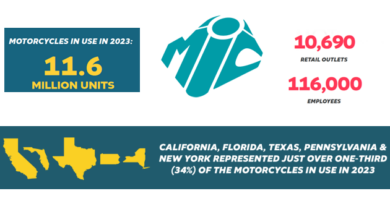July 2, 2007 – A close look at PWC insurance
With the summer months upon us, personal watercraft owners will be returning to the water in force. That idyllic picture, however, can be quickly shattered by an accident, an injury or even the theft of the vehicle.
Powersports Business recently took a closer look at what dealers — and their customers — should know about personal watercraft insurance.
Under Cover
After already spending a large amount of money on the purchase of a personal watercraft, it’s certainly understandable that many owners may be tempted to skip the added expense of insurance. Before that decision is made, however, the responsible dealer should at least make available information about insurance coverage, perhaps even the coverage provided by PWC insurance specialists like McGraw, Progressive or Ski Safe.
What coverages are necessary? That all depends on the customer, their budget and their immediate economic and liability concerns.
The primary areas to consider include coverage for physical damage or theft, liability and bodily injury, and medical payments for costs that occur as the result of an accident while aboard your PWC. This latter addition is especially important, according to the insurance insiders we spoke with, and is great coverage for the “towee” in watersports situations.
Additional coverages worth consideration include coverage for an accident with an uninsured boater, personal property replacement cost, towing, roadside assistance and trailer coverage, even coverage for fuel spill clean-ups or wreckage removal. In addition, many policies also will offer special coverages for watersports liability.
Many PWC owners fall under the mistaken assumption that their personal watercraft, parked on their property, is covered by their existing homeowner’s policy. If someone steals it, just call your local agent. According to the insurance sources we spoke with, that may have been true at one time, but only on models with less than 50 hp. Instead, a customer’s PWC must be covered under a completely separate policy.
“It’s very important that the customer considers a specialized policy,” said Dominic Mediate, boat product manager for Progressive, the nation’s largest PWC insurer. “Because they may not get the coverage under a homeowner’s policy that they think they’re going to get.”
What’s In, What’s Out
While many of today’s policies claim to be “all-risk,” meaning nearly everything is covered, many policies also typically contain notable exclusions, or instances that are not covered by the policy. It’s important to understand exactly what these exclusions are and how they can affect the PWC owner.
Typically, these exclusions could include damage or injury caused by striking a submerged object, or engine overheating. Modified craft also are typically excluded.
Forces of nature also deserve consideration. Many policies will include a deductible for damage caused by a hurricane or other natural disaster, even a strong windstorm.
And then there’s plain old theft. A policy may require the PWC to be housed within a locked enclosure, have a higher deductible or possibly even exclude coverage in high crime areas. Customers need to read and understand the entire policy before making a commitment.
Should a theft, act of vandalism or accident occur, whether in or out of the water, policy owners also need to understand that most personal watercraft policies are written on an actual cash value basis. That doesn’t mean if a craft is stolen or totaled the customer gets a new vehicle. Instead, it means the customer will get the equivalent of the vehicle’s worth, minus the deductible and after depreciation. In other words, that $10,000 PWC from 2005 will be worth considerably less in 2007. The insurance will only pay what it costs to repair or replace the craft up to the amount the craft is currently worth.
Some insurance companies do offer replacement cost, typically for new vehicles only and for a limited time period. Customers should inquire as to this option.
Loaning a PWC to a friend? The good news is from an insurance standpoint, the owner should be covered. According to the insurance sources we spoke with, any operator the PWC owner gives permission to ride is covered the same as the owner. In that sense, PWC insurance is like auto insurance — it follows the vehicle.
Limit Exposure
Another important form of insurance to consider concerns liability, the compensation that will be paid to third parties who may be injured or suffer property damage due to the fault of the insurance holder.
Liability insurance is typically offered in a variety of limits up to $1 million and can be written on a per-incident or claims-made basis. Liability insurance also is typically subject to certain limitations, which can include watersports towing, modified craft or use during nondaylight hours. “We don’t try to recommend limits of liability,” Mediate explained. “That has to be a consumer decision. They have to approach limits of liability from the standpoint of what assets are they trying to protect.”
Another concern? Location. Some policies require the owner to designate an area of usage, and might not offer coverage should the owner venture outside this area or take his or her PWC on a road trip. Customers should be cautioned to look into this provision, especially if they intend to tour. A responsible dealer also will encourage the customer to take an approved boating safety course, and make use of any theft-prevention devices offered on their craft. Many insurance companies will offer discounts based on these criteria.
Finally, dealers should inquire with the various insurance agencies about point-of-sales materials that can assist the salesman or F&I specialist or provide quick and easy quotes to customers. The materials can help the dealer understand how insurance can fit into their business model. In some cases, the F&I representative may even wish to become a licensed agent. Understanding how quickly a customer’s claim will be handled also is advantageous.
“We have claims reps who are specially trained in boat estimation and really turning customers’ claims around quickly,” added Progressive’s Shawn Fergus. “We understand how short the boating season is and how important it is to get those boats back on the water in a timely manner.” psb




